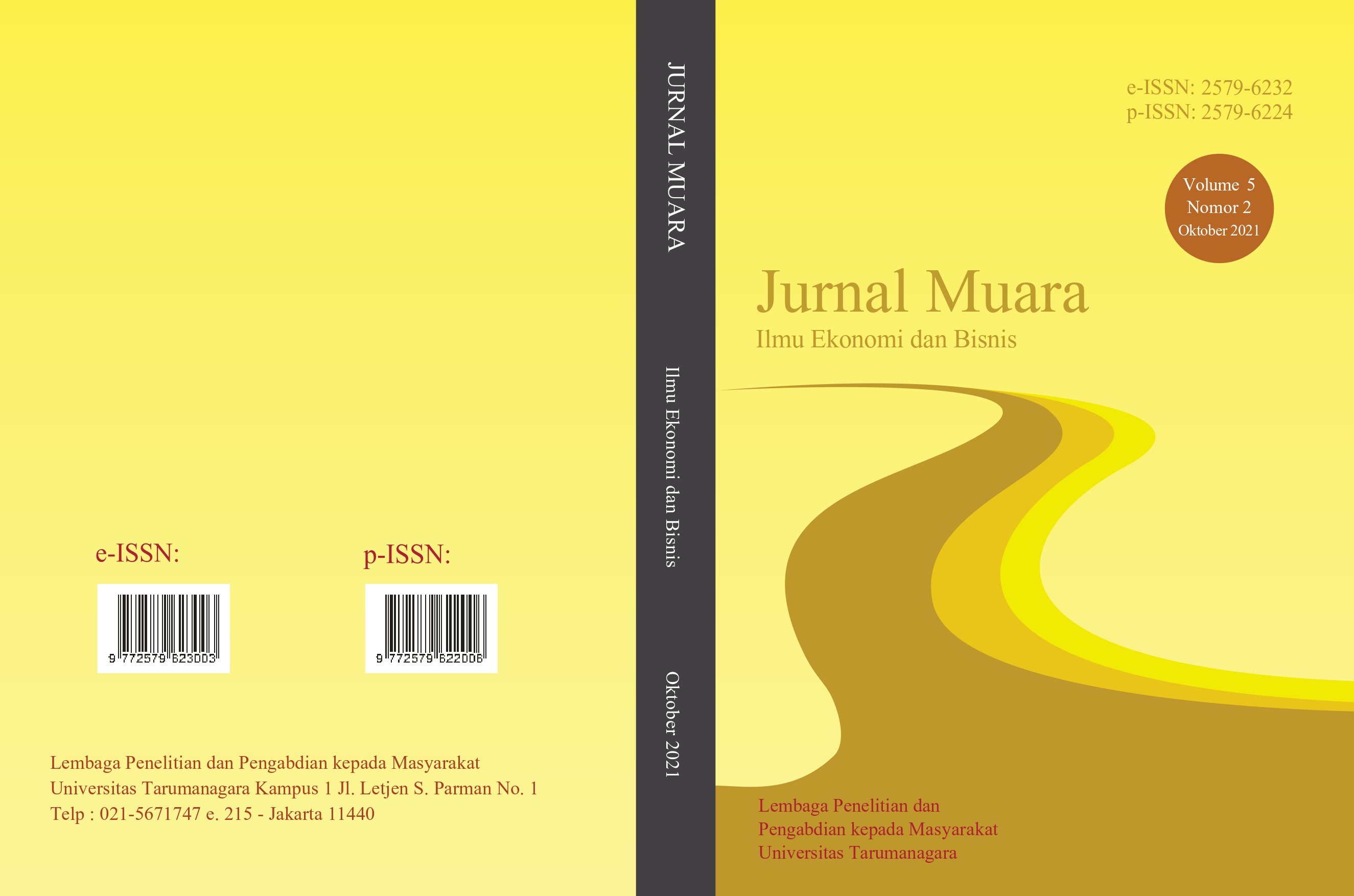PERANAN BENEFITS, TRUST SERTA EASE OF USE TERHADAP USAGE INTENTION PADA SEKTOR E-PAYMENT DI JABODETABEK
Main Article Content
Abstract
Penelitian ini dilakukan guna mengetahui dampak yang diberikan oleh benefits, trust, serta ease of use di dalam meningkatkan intensi konsumen untuk menggunakan berbagai layanan ataupun aplikasi e-payment yang ada sebagai media pembayaran utama yang konsumen gunakan sehari-hari. Adapun penelitian ini sendiri menggunakan kuesioner sebagai instrumen pengumpulan data yang disebarkan kepada 180 responden yang berpartisipasi pada penelitian ini. Adapun setelah dilakukan proses pengecekan dan validasi terkait dengan data yang telah diisi oleh seluruh responden, maka dapat disimpulkan bahwa seluruh data yang telah terkumpul merupakan data yang valid, reliable, serta dapat digunakan guna dianalisis pada penelitian ini. Seluruh data yang telah terkumpul selanjutnya dianalisis dengan menggunakan metode PLS-SEM. Berdasarkan pada hasil pengolahan data yang telah diperoleh, peneliti dapat menyimpulkan bahwa ketiga variabel independen, yaitu benefits, trust serta ease of use memiliki peranan yang signifikan di dalam mempengaruhi intensi konsumen untuk menggunakan aplikasi e-payment sebagai media pembayaran utama atas berbagai aktivitas pembelian ataupun aktivitas transaksi yang dilakukan.
This study was conducted in order to determine the impact which were given by several factors, such as benefits, trust and ease of use, on consumers’ intention to choose and use e-payment services as their main payment method when consumers are buying or making any purchasing activities on any goods or services that consumers would like to buy. A total of 180 respondents participated in this study, in which, questionnaires were used as the main instrument for collecting all of the data needed from the respondents. All of the collected data then were analyzed using PLS-SEM method, in which, based on the results of the data analysis, authors would like to conclude that all of these factors, which are benefits, trust and ease of use, play an important and significant role in affecting consumers’ intention in choosing and using e-payment services when consumers are buying products or services that they want to buy.
Article Details
References
Alleyne, P. dan Lavine, M. (2013). Factors influencing accountants' behavioural intentions to use and actual usage of enterprise resource planning systems in a global development agency", Journal of Financial Reporting and Accounting, 11(2), 179-200. https://doi.org/10.1108/JFRA-11-2011-0017
Alshurideh, M.T., Al Kurdi, B., Masa’deh, R. and Salloum, S.A. (2021), "The moderation effect of gender on accepting electronic payment technology: a study on United Arab Emirates consumers", Review of International Business and Strategy, Vol. ahead-of-print No. ahead-of-print. https://doi.org/10.1108/RIBS-08-2020-0102
Azmi, A., Ang, Y.D. dan Talib, S.A. (2016), "Trust and justice in the adoption of a welfare e-payment system", Transforming Government: People, Process and Policy, 10(3), 391-410. https://doi.org/10.1108/TG-09-2015-0037
Chau, P. dan Poon, S. (2003), “Octopus: an e-cash payment system success story”, Communications of the ACM, 46(9), 129-133
Garrouch, K.F. (2021), "Explaining the comparative perception of e-payment: role of e-shopping value, e-payment benefits and Islamic compliance", Journal of Islamic Marketing, Vol. ahead-of-print No. ahead-of-print. https://doi.org/10.1108/JIMA-08-2020-0240
Guriting, P. dan Oly Ndubisi, N. (2006), "Borneo online banking: evaluating customer perceptions and behavioural intention", Management Research News, 29(1/2), 6-15. https://doi.org/10.1108/01409170610645402
Indonesian E-wallet Race 2020 – GoPay, OVO, DANA, or LinkAja. (2020, May 11). Retrieved May 17, 2021, from https://m2insights.com/the-2020-indonesian-ewallet-race/
Jamshidi, D. dan Hussin, N. (2016), "Forecasting patronage factors of Islamic credit card as a new e-commerce banking service: An integration of TAM with perceived religiosity and trust", Journal of Islamic Marketing, 7(4), 378-404. https://doi.org/10.1108/JIMA-07-2014-0050
Kim, M.J., Kim, W.G., Kim, J.M. dan Kim, C. (2016), "Does knowledge matter to seniors’ usage of mobile devices? Focusing on motivation and attachment", International Journal of Contemporary Hospitality Management, 28(8), 1702-1727. https://doi.org/10.1108/IJCHM-01-2015-0031
Lee, S. and Kim, B.G. (2017), "The impact of qualities of social network service on the continuance usage intention", Management Decision, 55(4), 701-729. https://doi.org/10.1108/MD-10-2016-0731
Liao, S.H. and Yang, L.L. (2020), “Mobile payment and online to offline retail business models”, Journal of Retailing and Consumer Services, Vol. 57, doi: 10.1016/j.jretconser.2020.102230
Lwoga, E.T. and Komba, M. (2015). Antecedents of continued usage intentions of web-based learning management system in Tanzania, Education + Training, 57(7), 738-756. https://doi.org/10.1108/ET-02-2014-0014
Ming?Yen Teoh, W., Choy Chong, S., Lin, B. dan Wei Chua, J. (2013), "Factors affecting consumers’ perception of electronic payment: an empirical analysis", Internet Research, 23(4), 465-485. https://doi.org/10.1108/IntR-09-2012-0199
Newman, C.L., Wachter, K. dan White, A. (2018), "Bricks or clicks? Understanding consumer usage of retail mobile apps", Journal of Services Marketing, 32(2), 211-222. https://doi.org/10.1108/JSM-08-2016-0289
Perry, A. (2017), "Factors comprehensively influencing acceptance of 3D-printed apparel", Journal of Fashion Marketing and Management, 21(2), 219-234. https://doi.org/10.1108/JFMM-03-2016-0028
Phonthanukitithaworn, C., Sellitto, C. dan Fong, M.W.L. (2016), "An investigation of mobile payment (m-payment) services in Thailand", Asia-Pacific Journal of Business Administration, 8(1), 37-54. https://doi.org/10.1108/APJBA-10-2014-0119
Pipitwanichakarn, T. dan Wongtada, N. (2020), "The role online review on mobile commerce adoption: an inclusive growth context", Journal of Asia Business Studies, 14(5), 759-778. https://doi.org/10.1108/JABS-02-2019-0060
Putra, I.G.W.S.C. (2021). Pengaruh Product Usability Dan Cashback Promotion Terhadap Brand Loyalty Layanan Digital Wallet Di Indonesia, Bisma: Jurnal Manajemen, 7(1), 11-19. http://dx.doi.org/10.23887/bjm.v7i1.28413
San-Martin, S. dan Lopez-Catalan, B. (2013), “How can a mobile vendor get satisfied customers?”, Industrial Management and Data Systems, 113(2), 156-170 Tren Perkembangan Online Payment di Indonesia. (2020, July 10). https://midtrans.com/id/blog/tren-perkembangan-online-payment-di-indonesia.
Verma, S., Chaurasia, S.S. and Bhattacharyya, S.S. (2020), "The effect of government regulations on continuance intention of in-store proximity mobile payment services", International Journal of Bank Marketing, 38(1), 34-62. https://doi.org/10.1108/IJBM-10-2018-0279
Wilson, N. (2019). The Impact of Perceived Usefulness and Perceived Ease-of-Use toward Repurchase Intention in the Indonesian E-Commerce Industry, Jurnal Manajemen Indonesia. 19(3), 241-249. https://doi.org/10.25124/jmi.v19i3.2412
Wilson, N., Alvita, M., dan Wibisono, J. (2021). The Effect of Perceived Ease of Use and Perceived Security Toward Satisfaction and Repurchase Intention, Jurnal Muara Ilmu Ekonomi dan Bisnis, 5(1), 144-159. http://dx.doi.org/10.24912/jmieb.v5i1.10489
Wilson, N., dan Keni, K. (2018). Pengaruh Website Design Quality dan Kualitas Jasa Terhadap Repurchase Intention: Variabel Trust Sebagai Variabel Mediasi, Jurnal Manajemen dan Pemasaran Jasa, 11(2), 291- 310. http://dx.doi.org/10.25105/jmpj.v11i2.3006
Wilson, N., Keni, K., dan Tan, P.H.P. (2019). The Effect of Website Design Quality and Service Quality on Repurchase Intention in the E-commerce Industry: A Cross-Continental Analysis, Gadjah Mada International Journal of Business, 21(2), 187-222. https://doi.org/10.22146/gamaijb.33665


